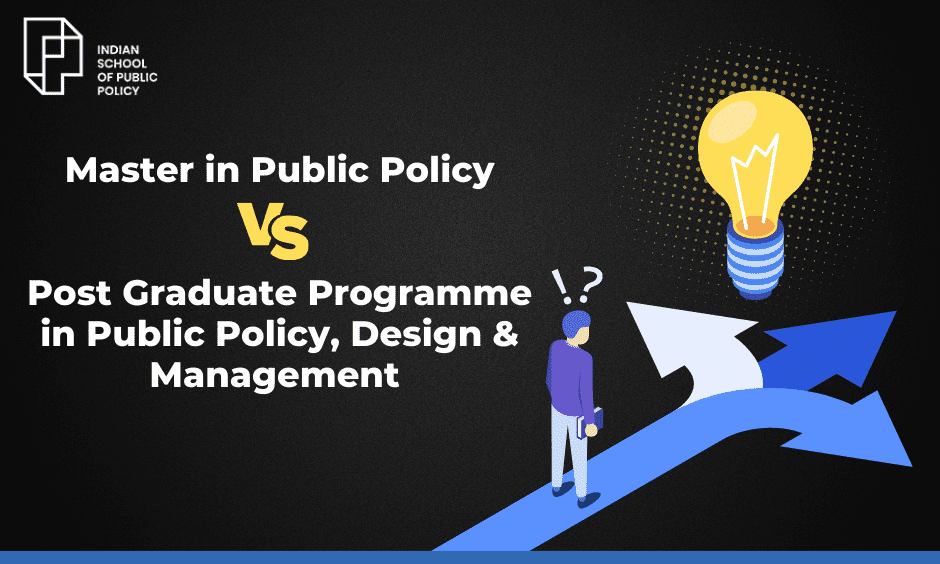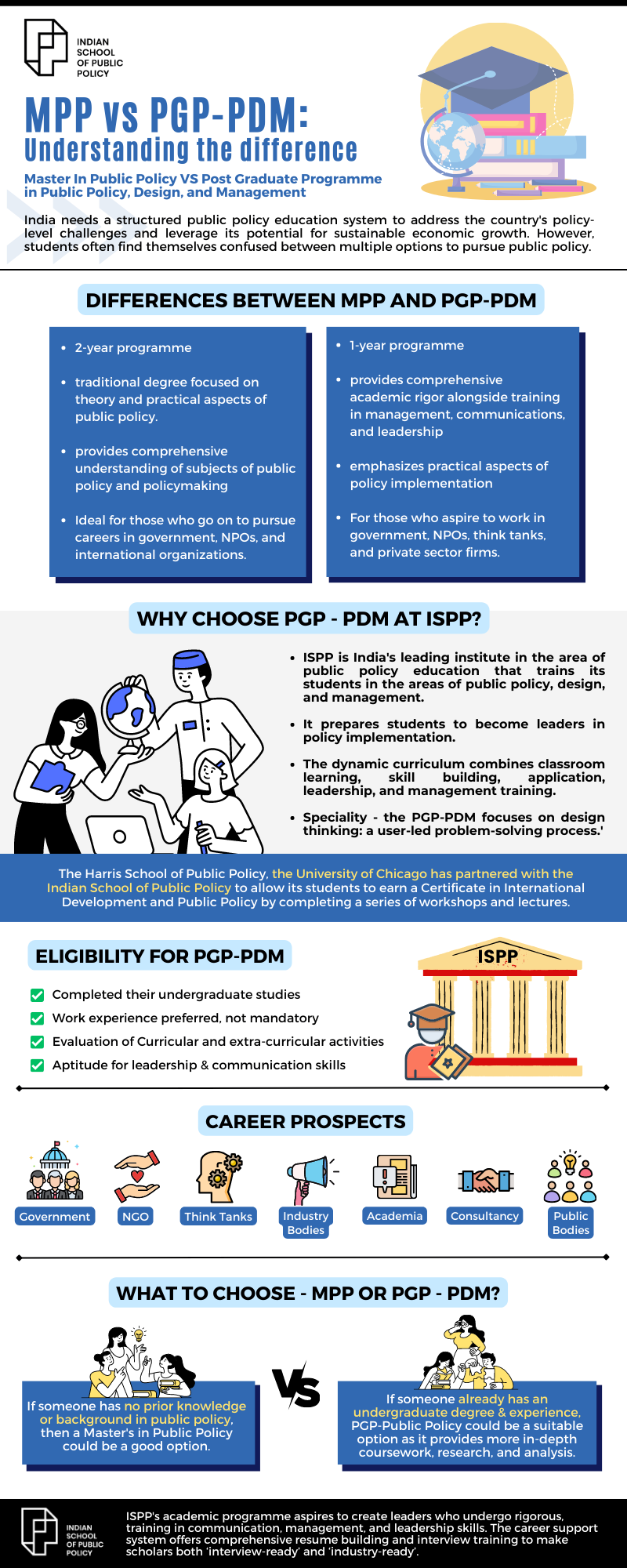
Master In Public Policy VS Post Graduate Programme in Public Policy, Design, and Management

Both a Master’s in Public Policy and a Post Graduate Programme in Public Policy have a similar focus on studying policy-making and implementation in the public sector. However, the curriculum and structure of each programme may differ depending on the institution that offers it. Those interested in applying for Public Policy programmes in India must research specific institutions and their offerings to identify the best programme that aligns with their goals and interests. Location, cost, and language requirements are additional factors to consider when selecting a program. It is important to note that admission requirements for international students may vary across universities, hence researching the specific requirements for each programme is necessary. To make an informed decision, individuals should evaluate each institution’s programme details, admission requirements, curriculum, and personal goals and preferences.
Overview Of The Two Programmes
A Master in Public Policy (MPP) is a graduate degree programme that focuses on the study of government policies and their impact on society. The programme aims to provide students with a strong foundation in the theoretical and practical aspects of policy analysis, implementation, and evaluation. Students are trained to analyse policy issues and develop solutions informed by evidence and best practices. The curriculum covers a wide range of topics including economics, political science, sociology, law, and management. Graduates of MPP programmes go on to pursue careers in government, non-profit organisations, and international organisations.
A Post Graduate Programme in Public Policy in India, on the other hand, is a graduate-level programme designed to equip students with a thorough understanding of public policy-making and implementation. The programme is aimed at students who aspire to work in government, non-profit organisations, think tanks, and private sector firms that engage with public policy. It covers a wide range of subjects, including economics, political science, law, management, and sociology. The PGP-Public Policy curriculum emphasises the development of analytical and critical thinking skills, research methodology, and effective communication. Graduates of the programme are equipped with quantitative and qualitative methods and skills necessary to evaluate policy issues, analyse data, and design evidence-based solutions to complex policy problems. Many universities in India offer PGP-Public Policy programs, and applicants should consider factors such as admission requisites, programme structure, and career outcomes while choosing a program.
Differences
Master’s in Public Policy (MPP) is a broader, more comprehensive programme that covers a wider range of subjects related to policy-making, including economics, political science, sociology, and law. MPP programmes are often offered by universities in countries outside India, such as the United States, the United Kingdom, or Australia, and are typically two-year programs.
On the other hand, a Post Graduate Programme in Public Policy is a more focused programme that typically emphasises the practical aspects of policy-making and implementation in India. This programme curriculum is tailored to the country’s policy issues and challenges.
While both MPP and PGP-Public Policy aims to provide students with a strong foundation in public policy, here are the course specifications, programme structure, and outcomes that can vary significantly.
Course Duration
Master’s In Public Policy
A 2-year traditional master’s degree.
Post Graduate Programme in Public Policy
The programme duration – One-year programme gives this course an edge over the traditional master’s programme as the scholars spend less time studying, and more solving real-world challenges.
Curriculum
Master’s In Public Policy
The Master’s in Public Policy curriculum is designed to incorporate international best practices and is contextualised to address the complexities of the Indian ecosystem. It provides a comprehensive understanding of Indian governance and policymaking structures and approaches. The programme also includes dedicated skill workshops that teach students how to negotiate and persuade, write public speeches and Op-Ed columns, and communicate effectively in various professional settings. In addition, students have the opportunity to specialise in a particular area through elective courses.
Post Graduate Programme in Public Policy
The Post Graduate Programme in Public Policy prepares students to become leaders in policy implementation. Our students undergo a comprehensive academic programme in Public Policy and are rigorously trained in management, communication, and leadership skills. The one-year academic session is divided into 8 terms of 6 weeks each.
The Indian School of Public Policy (ISPP) is a premier institute in India that offers a one-year Post Graduate Programme in Public Policy, Design, and Management. It aims to train and develop leaders for policy action who can bring about positive change in society, government, and business. The curriculum is designed to provide a balance between theoretical and practical knowledge, with an emphasis on skills, ethics, and leadership. The programme is divided into 8 terms, with courses ranging from core to supporting, covering various aspects of public policy.
The academic programme focuses on developing skills, ethics, and leadership qualities to nurture experts in theory and practise with the objective of creating a positive impact. The curriculum integrates classroom learning, skill building, application, leadership, and management training, consisting of foundation, core, and supporting courses. The PDM also focusses on Design Thinking, a ‘User-led problem-solving process’ or a ‘Human-centred opportunity-resolution journey that goes beyond aesthetics and revolves around evolution and progress. It is integrated into the course, along with a public policy challenge, for the students to learn how to empathise with others, generate ideas to solve the problem, prioritise and come up with a prototype for a new solution.
ISPP provides a platform for scholars to interact and engage in healthy discussions and debates, both inside and outside the classroom. The institute accepts applications from individuals with diverse educational backgrounds and work experiences, who are passionate about policymaking and committed to bringing about a positive impact in society.
Register your Interest to Study at ISPP
The Harris School of Public Policy, the University of Chicago has partnered with the Indian School of Public Policy to assist in its mission of providing policy professionals with the necessary intellectual capital to tackle current and future governance challenges. It allows the ISPP scholars to earn a Certificate in International Development and Public Policy by completing a series of workshops and lectures held by its faculty, practitioners, and other experts. The aim is to establish thought leadership and explore synergies for future collaborations, with a view to advancing the study of public policy and research and assisting in addressing India’s developmental challenges.
Eligibility Criteria
Master’s In Public Policy
- Applicants can be in their final year of undergraduate study, or working professionals with a bachelor’s degree (Work experience is a bonus but not mandatory)
- Students from different professional backgrounds are welcome to apply.
- Candidates need not have any prior experience in public policy.
- Candidates must be ambitious, driven, focused, and committed to making a change in Public Policy.
Post Graduate Programme in Public Policy (PDM)
- Open to candidates who have successfully completed their undergraduate studies, regardless of discipline, from an Indian or International University.
- Scholars with prior work experience in relevant domains are preferred, however, not mandatory for exceptional candidates.
- Curricular and extracurricular activities are also analysed closely to evaluate the scholar’s excellence and commitment.
- The scholar’s ability to work collaboratively, aptitude for leadership, communication skills, humility, and adaptability are some of the characteristics essential for pursuing the PG Programme.
The PG Programme offers personal and professional growth opportunities, and hence, welcomes students from diverse backgrounds as it enriches the learning experience for everyone.
Career Scope
Master’s In Public Policy
The Master in Public Policy (MPP) programme is designed for those seeking to promote equity and balance among Society, Government, and Business. After graduation, MPP graduates can consider a variety of opportunities in different sectors.
In the private sector – Graduates can work as business or policy consultants for large corporations or private organizations focused on policy implementation. The curriculum includes financial reporting, management, and cyber security courses to cater to this stream.
In the public service sector – MPP graduates can pursue policy-making and implementation, government roles, and political candidacies. The curriculum offers subjects such as politics, public policy design and analysis, ethics, constitution and law, and political campaign management to support these career paths.
In the non-profit or social enterprise sector – The MPP programme aims to build entrepreneurship skills with a focus on social development. Students can choose from subjects such as gender, strategy, organizational behavior, energy and climate change, negotiation, and corruption to build skills for driving greater impact in this sector.
Also Read – Why Study Public Policy? What Makes It Important Now More Than Ever?
Post Graduate Programme in Public Policy (PDM)
A deep understanding of public policy enables individuals to comprehend the challenges faced by their country and modify or introduce new policies and programs. It equips learners with the necessary knowledge to analyze and understand emerging issues affecting citizens, the economy, the environment, and other national and international concerns. In countries like India, specialised courses in public policy were introduced relatively recently. Those with an educational background in public policy can enter a wide range of sectors, including government, private organizations, and other areas where innovative ideas are required for the country’s development. Public policy education also opens up multiple career paths, including roles in think tanks, independent research centers, teaching, research and development, and non-governmental organizations.
In the government sector – Many areas require knowledge of public policy, such as environment, social sciences, international relations, political science, administration, law, management, geography, economics, science, maths, and statistics. State and central governments offer several opportunities, especially those involved in rural and urban planning.
Advanced research in public policy – For making a successful career, as numerous national and international organizations are involved in research and development activities. Many institutes offer advanced courses and research opportunities for students to pursue promising careers.
Teaching – For those passionate about educating others, public policy is a highly respected course in Indian universities, and institutes train students and even offer placement opportunities. Students with a passion for teaching can become lecturers and professors in various public and private universities.
Public administration and public policy – Public administrators require in-depth knowledge of both society and policies to successfully execute their duties in a more precise and ethical manner towards the government and the people.
Management and public policy – Pursuing a course in public policy helps programme and operations managers understand how to manage and cope with financial and HR policies and design effective public policy strategies. Training in public policy equips employees with soft skills such as time management techniques, handling multiple projects, and building resilience during stressful times.
ROI
Master’s In Public Policy
Total Programme Fee – Rs. 13,60,000 for 2 years
The average salary for a Master of Public Policy in India is around INR 7 LPA.
Post Graduate Programme in Public Policy (PDM)
Total Programme Fee – ₹8,40,000 (+18% GST)
The average salary for a PG Programme in Public Policy is between 8 – 9 lacs.
What Should A Public Policy Aspirant Opt For – PGP-Public Policy Or A Master’s In Public Policy?
The choice between PGP-Public Policy and a Master’s in Public Policy would depend on the individual’s specific career goals and current level of education and work experience.
If someone has no prior knowledge or background in public policy, then a Master’s in Public Policy could be a good option. It is a 2-year full-time programme that provides a foundational understanding of public policy and equips students with essential management and leadership skills.
On the other hand, if someone already has an undergraduate degree, and experience in the said field and is looking to enhance their understanding and skills in this subject, then the PGP-Public Policy could be a suitable option as this programme typically involves more in-depth coursework, research, and analysis, and provides opportunities for specialisation in a variety area of public policy.
Why Should I Pursue The Post Graduate Programme In Public Policy, Design, and Management Offered By ISPP?
There are several reasons why pursuing the Post-Graduate Programme in Public Policy offered by ISPP can be a wise decision.
- The programme is designed to equip students with a comprehensive understanding of public policy issues and challenges, while also imparting management, communication, and leadership skills.
- The programme offers a unique opportunity for students to engage with and learn from experienced policymakers, academics, and industry experts.
- The program’s curriculum is designed to be dynamic, with a focus on current and emerging issues in public policy.
- Graduates of the programme have access to a wide range of career opportunities across sectors, including government, private organizations, and non-profits.
The Post Graduate Programme in Public Policy, Design, and Management offered by ISPP can help you develop the knowledge, skills, and networks needed to become a successful public policy professional.
Check Infographics



